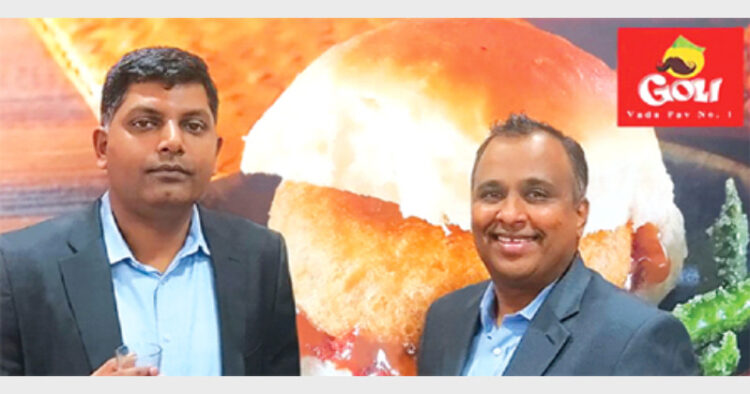Nationalist come in all shapes, sizes and way. Venkatesh Iyer, co-founder of Goli Vadapav, found it disturbing that he did not have any Indian brand in the list of products he consumed on a daily basis.
Vada Pav, a traditional food is an industry in itself, but no one was ready to break this barrier. Finally, two friends Venkatesh Iyer and Shivdas Menon chose to become entrepreneurs by mainstreaming Vada Pav.
Venkatesh Iyer, a Mumbaikar who is well versed with corporate culture, says one day while he was returning from the workplace, he came across a Vada Pav cart that was parked with a purpose under the 40-ft huge McDonald’s banner outside the famous VT Station. He saw there was a huge demand among the locals for this street food vendor. Enthused by the response of Mumbaikars, he too went to the Vada Pav cart and ate to his heart’s content. Both Vada Pav and Burger are similar in many ways, but one was sold under a huge brand name while the other was struggling to make a mark. Realising that this Maharashtrian snack was scoring over staple Western fast food, Venkatesh saw the possibility of becoming successful in this business of Vada Pav. Putting his experience into practice, this corporate financing expert invented in Goli Vada Pav. Initially, an investment of around Rs 30 lakh was made. It was named Goli because it had a touch of Mumbai and he and his partner wanted it to give a local flavour to foodies.
Goli’s first shop was opened in Kalyan, Thane in 2004. Soon it became an instant success. Budding entrepreneurs approached Venkatesh and Shivdas to take their franchise, and within a short span fifteen more outlets of Goli’s Vada Pav were opened across the country.
With no plate or spoon required for Vada Pav, this fast food snack became one of Mumbai's favourite breakfast items. The best thing about this snack is that it doesn’t need publicity. However, it was not a cakewalk. Initially, this company struggled and had to suffer losses. The biggest problem faced in starting this food business was that quite a few Vada Pavs were getting wasted. If 3,000 Vada Pavs were made in a day then 2,500 were sold. All this unpredictability didn’t go down well with Venky and he started looking for solutions.
Today, Goli has a central manufacturing capacity in Mumbai from where Vada Pavs are prepared and transported across the country. Their state-of-the-art technology enables this tasty snack to be stored in a frozen form and sent every 2 or 3 days to shops, where they are again stored properly. This has made it possible for Goli’s Vada Pavs to have an extended shelf life of nine months.
Extended Shelf Life
On a valid suggestion, Venkatesh and Shivdas approached Vista Foods, an Indian company that works with many food chains. Vista liked and agreed with Goli’s concept and offered a back-end partnership. Under this, Vada Pavs will be cleared by Vista Foods. Now the Vada Pavs will have to be passed through metal detectors and X-ray machines as a quality check before delivering them to customers.
“Standardisation and technology have helped us create a model which can help everyone. Otherwise if a Delhi businessman would have our franchise and had to do local sourcing and production then there would have been price fluctuations in 6 months and different kinds of problems would have risen. But now that is not an issue as the supply is done centrally,” says Venkatesh. Goli has followed the strategy of being located in high streets and main market places because such places have the maximum crowd. With food habits formed and brand established, Goli is now on its way to experimentation. They have introduced items like Sabudana vada, palak-makai vada and masala vada to cater to local demands.
In Mumbai from where Vada Pavs are prepared and transported across the country. Their state-of-the-art technology enables this tasty snack to be stored in a frozen form and sent every 2 or 3 days to shops, where they are again stored properly. This has made it possible for Goli’s Vada Pavs to have an extended shelf life of nine months
After this transition in business, customers’ trust in the brand increased. “We were able to establish ourselves as a big brand and as a quick-service restaurant,” he added.
Impressed by Goli’s strategy, a Chennai-based industrialist invested Rs 21 crore in it in 2011. This has given the brand an opportunity to open their outlet in every part of the country. Today Goli’s Vada Pav is spread across hundred cities in 15 States of the country and has three hundred outlets. Goli sells Seventy thousand vada pavs daily and offers its customers with a wide range of Vada Pavs in various flavours like Classic, Samosa, Schezwan, Spinach and Corn.














Comments